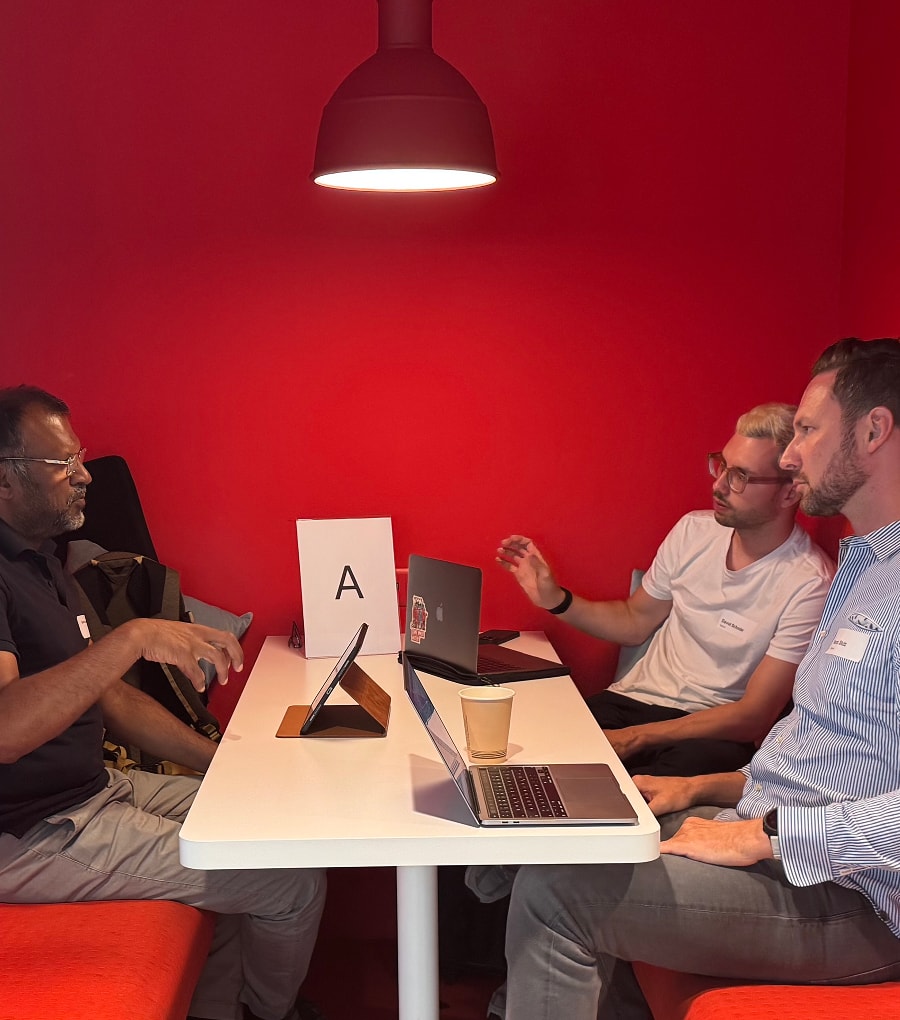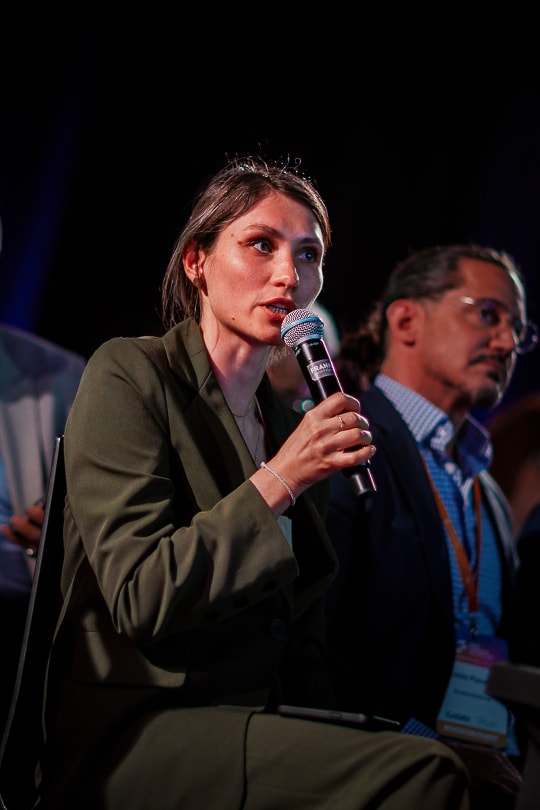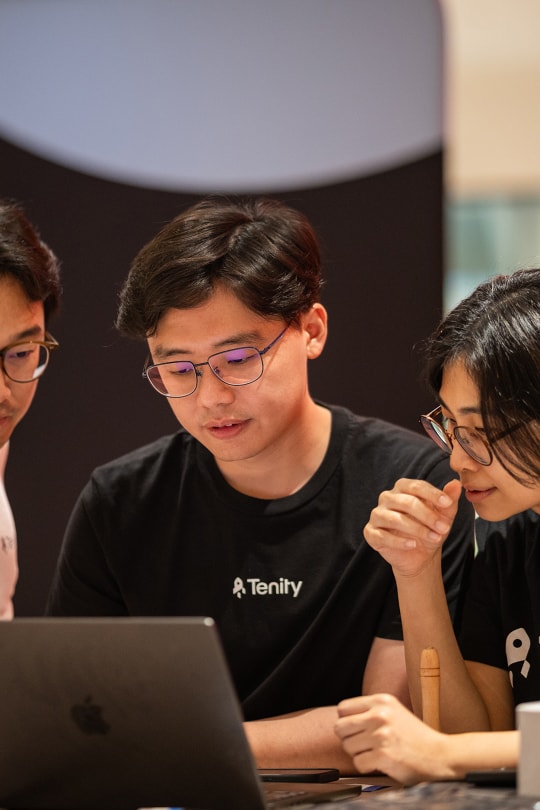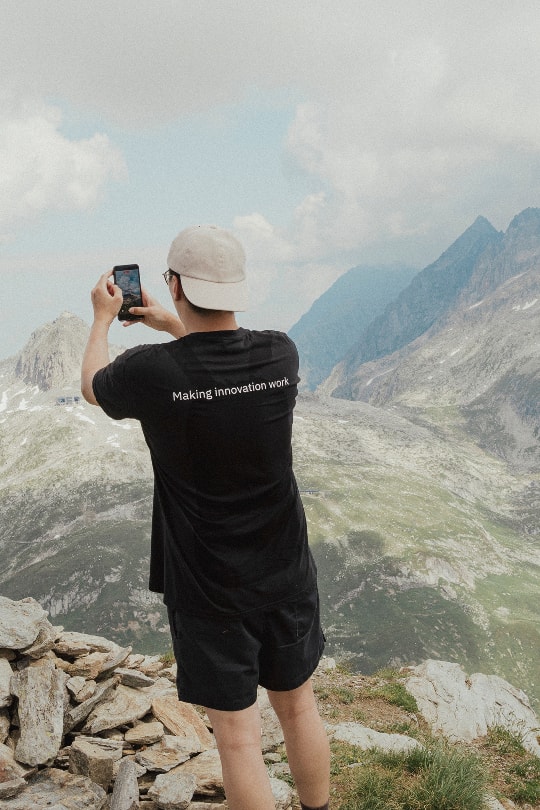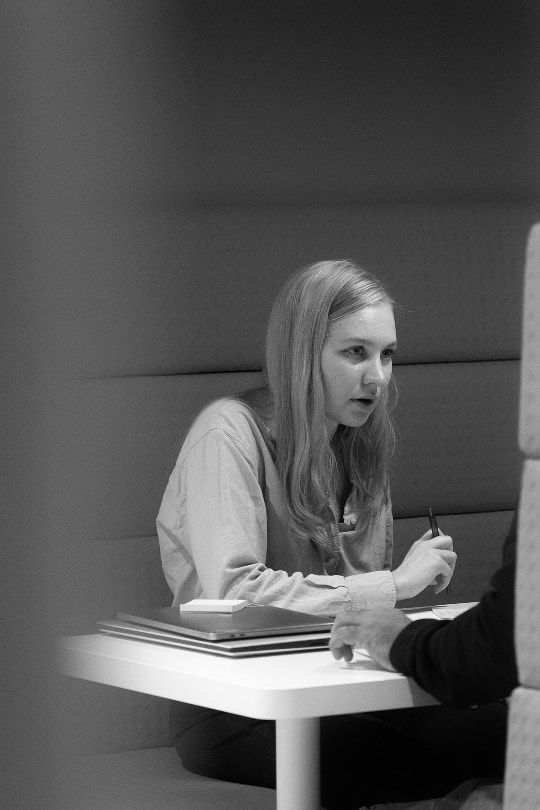Corporate accelerator programs are part of a corporate’s open innovation strategy, connecting companies with startups to co-develop solutions, run pilots, and create measurable business impact.
A corporate accelerator program is a time-bound initiative where established companies collaborate with startups to solve strategic challenges. These programs are a core part of corporate innovation, helping corporates access emerging technologies, test ideas faster than internal R&D, and build meaningful partnerships with high-potential ventures.
At Tenity, we have been running corporate accelerator programs since 2015. Born from the Swiss Stock Exchange, corporate innovation is in our DNA. Over the years, we have facilitated over 200 successful collaborations between corporates and startups, helping companies like UBS, SIX, Ripple, Visa, Isbank, or neosfer and CommerzBank turn innovation into measurable outcomes.
Whether you are a startup looking to join an accelerator or a corporate exploring how to launch your own program, understanding the role of corporate accelerators in the wider innovation landscape is the first step.
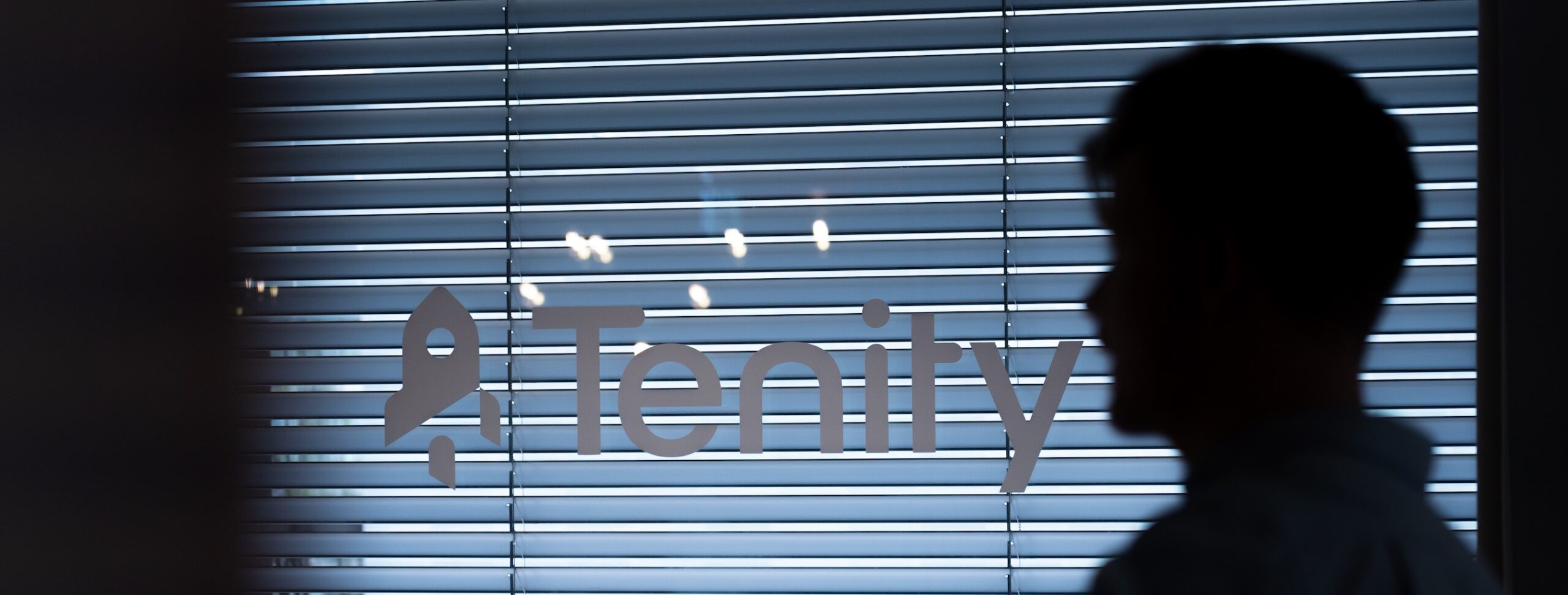
In this article, we’re covering:
- Understanding Corporate Accelerators vs. Incubators and Innovation Programs
- When Is the Right Time to Launch a Corporate Accelerator?
- What Corporates Gain from Accelerator Programs?
- Our Process for Running Corporate Accelerator Programs
- Case Study: bLink and Deedster
- Case Study: Joint Innovation Accelerator for Sustainable Finance
- Conclusion: Corporate Accelerator Programs – Getting Started
Understanding Corporate Accelerators vs. Incubators and Innovation Programs
If you’re doing research on corporate innovation programs, you’ll likely come across different phrases to describe different types of programs. The exact definition of each will depend on who you talk to, but here’s how I would define each one:
Corporate innovation programs: anything innovation related
An innovation program includes any effort undertaken by a company (usually a corporate) to innovate, either internally or externally.
If it’s internal, corporates usually establish dedicated teams to experiment with new technologies (e.g. web3) and see how innovation can play into the wider corporate strategy and explore new ideas (e.g. internal web3 use cases). When it’s external, it usually includes partnering with universities, specialist startup accelerators or investing in a fund or startups.
Essentially, corporate innovation programs include anything a corporate does to foster innovation, whether it’s internal or external.
Corporate incubator programs: focused on early-stage ideas
Whereas innovation programs include anything to do with innovation, incubators are a lot more focused on early stage ideation. In other words, setting up a safe environment where startups and corporates can come up with new ideas. I like to think of incubators as a way to build the muscle to prepare for what is likely coming.
Incubators are about exploring a problem and helping the corporate culture get used to the idea of innovation.
For example, we worked with Julius Baer to better understand web3 via a corporate incubator program. This program allowed Julius Baer to get access to successful startups that had already developed use cases in relevant fields such as automated digital advice, retirement planning and alternative platforms. It also offered startups exposure to the Julius Baer network and allowed them to build relationships with people they could never have access to otherwise.
Corporate accelerator programs: designed to solve a specific problem
Corporate accelerator programs focus on collaborating with more mature startups that have already developed viable products and usually have product-market fit, and which then help the corporate solve a specific problem. An accelerator is also time-bound, lasting between 3-6 months, sometimes as little as 3 weeks.
With an accelerator, the result is often proof of concepts, results of an experimentation and sometimes a partnership, investment or even acquisition of the startup.
For example, last year we set up a corporate accelerator program for the Isle of Man Government. The Insurtech Acceleration Program brought together leading insurance companies and late-stage startups with proven experience in the specific topics: wealth management, policy management, and customer onboarding.
The open call for startups attracted 70 applications, of which we jointly handpicked 7 to participate in the accelerator. Through the 12 week program, the selected were challenged to develop Insurech solutions, leveraging the Isle of Man’s experience as a hub of insurance expertise and the support of mentors including the program’s partners: Zurich, Utmost, RI360, Momentum International, EIP and Hansard.
Together, these three approaches form the foundation of a company’s corporate innovation strategy, moving from ideation (incubators) to validation (accelerators) to long-term growth (investments and partnerships).
When Is the Right Time to Launch a Corporate Accelerator Program?
Ultimately, it depends on the level of maturity of your organisation. The corporates I come across that are interested in accelerators typically fall into two main groups:
- They have a clear understanding of their needs and are seeking a solution.
- They seek our guidance on innovation and are less familiar with the available programs. They are interested in learning about startup ecosystems and how participating in a program can benefit the company
Here are some signs that your company might be ready to set up a corporate accelerator program:
You’ve tried internal innovation before and it hasn’t worked
The key issue I see with corporate innovation programs is that it’s very hard to measure the return on investment and to accurately measure the success of your innovation programs, especially in the short-term. Often corporates stop internal programs because they aren’t delivering enough return on investment (ROI).
Also, many innovation programs invest substantial time and effort into a specific idea, only to end up with little impact. This phenomenon, known as ‘innovation theatre’, can stem from various structural issues such as an absence of clear KPIs or outdated internal processes. Our experience might be useful in such a situation.
You’ve got a new leadership team
One of the best times to set up a corporate innovation program is when a new leadership team comes in. That’s when a new momentum is brought to a company and new perspectives can be a catalyst for innovation.
You’re seeing more competition and new technologies in the market
In the past few years, we’ve had NFTs, AI, web3 and a whole host of other new technologies. To stay relevant, corporates need to stay on top of new technologies to ensure they stay ahead of the curve. When you start seeing increased competition or a technology that’s hot, that’s when it’s a good time to launch a corporate accelerator program.
For example, since 2015, the digital banking app Revolut has reshaped the bank market by appealing to younger generations. The app has over 20 million registered users, and the neobanking market as a whole has penetration of 7.3%. Revolut is a great example of how a fintech company has encouraged the financial services industry to innovate, and changed some consumer habits (nearly 2 in 5 people in the UK have a digital-only bank account alongside a traditional bank account).
Ultimately, innovation is not a luxury, it is an absolute necessity. By embracing innovation and being well-informed about new trends and technologies, corporates can adapt to and thrive in a changing market.
What Corporates Gain from Accelerator Programs
At Tenity, we see innovation through a three-pillared approach: Learn, Collaborate, and Invest.
Learn: understand the world of startups and innovation
A first step is to learn about the upcoming trends, fast-growing startups and become a part of the ecosystem. Starting an accelerator program focusing on collaboration should not be an isolated first step. If you intend to work with startups, make sure to first learn and understand the world of startups.
We help corporates understand and learn about the world of startups with:
- Community events.
- Conferences.
- Executive events.
- Startup database.
See our upcoming and past events here: Tenity Events
Collaborate: work together with startups
Once your company and team understands better the world of startups and innovation, the next step is to start collaborating and working with these startups. At Tenity, we do this with our corporate innovation programs that lead to:
- Deal flow sessions.
- Collaboration support in proof of concepts (POCs).
An example of a successful collaboration between a corporate and a startup is UBS and Yokoy. Yokoy allows large companies to fully automate the complicated processes of spend management. Through the partnership, UBS offers its corporate clients seamless access to Yokoy’s automated spend management tool, which includes automatic data reconciliation, simplifying credit card management and digitising and analysing receipts.
Invest: get skin in the game
The third step of innovation is for the corporate to truly become part of the startup world via investment or acquisition. At Tenity, we enable this with:
- Join our investor community and become part of the ecosystem.
- Become a Limited Partner in our fund by investing in our early stage fintech fund
For more information on how you can invest with Tenity, check out our Investor page.
For example, PXL Vision, a graduate from the 2019 Tenity Incubation Program, raised a CHF 4.6m Seed Round in 2020, led by SIX Fintech Ventures. SIX Fintech Ventures was able to vet the early-stage startup thoroughly during the program, and decided to invest after its successful graduation. PXL Vision has since emerged as one of the leading automated identity verification providers in the Swiss market.
You may like: How will AI transform the banking industry?
A corporate accelerator program should deliver tangible outcomes across three pillars: Learn, Collaborate, Invest.
Our Process for Running Corporate Accelerator Programs
We’ve been through corporate innovation ourselves, and to date we’ve facilitated over 50 successful collaborations between corporates and startups.
Over the years, we’ve developed a reliable process to help corporates set up a corporate accelerator program. Here’s what the process looks like:
1. Define your goals
We’ll conduct an introductory workshop: we kick off the program with a workshop to help understand your goals. We’ll outline current and emerging trends in your sector, and help you define the right KPIs.
Identify an innovation champion: Right from the beginning we aim to turn certain key decision makers in your company into ‘program ambassadors’ – or as we like to call them, innovation champions. We’ve found it’s important that internal stakeholders embrace the program and welcome the presence of a startup team.
2. Start scouting and speed dating
Matchmaking with Tenity: Once the program structure and KPIs are in place, we’ll start looking for potential startup partners that fit your ideal startup persona. With our proprietary startup database counting over 2,000 startups, our deep network in relevant startup ecosystems across Europe and Asia, and expert startup scouts, we know where to find and how to select the best partners. Not only from a technological solution point of view, but taking into account soft factors that can strongly impact collaboration success.
Dealmaking sessions: When you join our ecosystem, we’ll always be one phone call away. During the speed dating process, we arrange sessions where you can evaluate if the startups are a good fit. Our goal is to establish trust and understanding, which will enable both parties to get the most of the program going forward.
On the ground research: At Tenity, we have people on the ground in: Switzerland, Singapore, Nordics & Baltics and Spain. Our local presence in those innovation hubs gives us proximity to these startups and allows us to directly engage with their founders and team members.
3. Explore use cases and collaborate
Coaching and guidance: Once we have found a match, we’ll get into the main component of the process: learning and collaboration. Use Case Exploration workshops are a key engagement point, allowing both startups and corporates to conduct in-depth exploration of the specific challenge and develop a plan for the necessary steps.
Mentorship sessions: These sessions allow the startups to upskill themselves by talking with mentors about an array of topics including business development and scaling. We have over 200 mentors from the fintech and tech space within our ecosystem.
Exploring Proof of Concepts: In these sessions, corporates and startups get together and deep dive into any requirements or constraints from the corporate (e.g. regulatory or technological requirements) and evaluate how a pilot or PoC would look like.
4. Demo day
Celebrate the work: To bring the program to a close, we typically organise an event for the startups to present their progress and final results to a wider audience. A demo day is the perfect opportunity to bring visibility to the program and showcase what you have achieved to all internal stakeholders within the corporate.
At Tenity, we help corporates design and operate bespoke accelerator programs from strategy to demo day.
Case Study: bLink and Deedster Collaboration
bLink, an open banking platform by SIX, connects banks and fintechs in Switzerland, offering account access, payment submission, and wealth management services.
Deedster, a Swedish climate fintech, focuses on creating climate awareness using data-driven technology across employee engagement, SME service, and retail for banks.
bLink collaborated with Tenity to scout and curate startups for a potential collaboration. Deedster joined Tenity’s Open Innovation Program, allowing bLink to explore Deedster’s offerings and track record.
After an initial pitch event, the collaboration process began with a use case exploration. Through further deep-dive sessions Deedster identified what would be required to bring the CO2 footprint calculator to Switzerland and developed an early version of the program.
Deedster was seeking market expansion after successfully working with nearly 80 banks and corporates across Europe. The bLink collaboration offered them entry into an attractive market and a corporate sponsor who understood their value proposition.
The partnership led to a successful proof of concept using anonymized data, offering a standardised and easy-to-integrate API-based solution for private customers. Banks in Switzerland can now provide added value to their clients, while Deedster benefits from accelerated market entry and bLink’s network for potential clients.
Read the case study in more detail: Driving Sustainability through Open Banking
Case Study: Joint Innovation Accelerator for Sustainable Finance
For example, last year we collaborated with neosfer and CommerzBank to set up the Joint Innovation Accelerator for Sustainable Finance.
The program’s goal was to develop proof-of-concepts (PoCs) and foster collaborations between startups and CommerzBank business units to promote innovative solutions in key sustainability areas, including:
- Biodiversity and climate data
- Real estate and renovation management
- Supplier management
- Corporate mobility
Ten cutting-edge startups were hand-picked to join the program. Over two months, they participated in tailored sessions and events designed to enable collaboration, covering:
- Open exchanges and use case definition
- PoC roadmap preparation and validation
- Fundraising and growth hacking workshops
- Pitch training to prepare for market engagement
The program concluded with Demo Day at the Impact Festival in Frankfurt, Europe’s largest B2B community for sustainable innovation, organized by neosfer.
This collaboration demonstrates how a corporate accelerator program can combine startup innovation, sustainability goals, and measurable proof-of-concepts within a short time frame.
Corporate accelerator programs: get started as a corporate
Corporate accelerator programs are an excellent tool for corporates to get a better understanding of the startup and technology ecosystem and therefore better innovation results.
A well-executed program can generate proof of concepts and potentially lead to successful new product rollouts, investments or even acquisition. However, it’s important as a corporate that you assess your level of maturity internally and make the right decision for your company.
Are you a startup looking for an accelerator to join? Explore our latest startup programs to see which might be the right fit.

